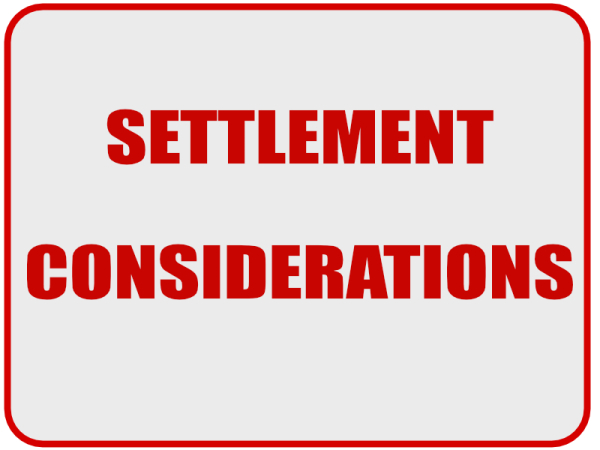SETTLEMENT CONSIDERATIONS ![]()
SETTLEMENT CONSIDERATIONS

As most personal injury lawyers in Orangeburg will tell you, the vast majority of civil cases end of settling between parties before going to a final jury verdict. The settlements can occur at any time after one party's liability causes damages to another party. This could be after a personal injury matter (like a car wreck or slip and fall), or could be after a breach of contract. Settlements take all forms, from informal offers by one party after the wrong to resolve the matter all the way up to a settlement during trial between the parties before the case goes to the Jury (at which point it's too late). Though lawyers usually set up mediations, it's important for clients to understand the process and ensuring the result is a clear and permanent resolution between all parties involved.
The earliest type of mediation within the cycle of litigation is called a "pre-suit mediation". This is when parties have not been able to resolve an issue involving liability and damages to party(s) by offer and counter-offer between parties and/or lawyers. In this type of mediation, a party (or parties) are ready to file suit, but making a last ditch effort to resolve the matter. A strong benefit to this type of mediation is in parties avoiding all the expenses of filing suit and discovery. They will normally agree to split the cost of a mediator, but that is the only expense involved (Note: Mediators are typically $250-400 per hour in South Carolina, and that cost is usually covered equally by both parties. The length of time for mediation can vary from an hour to all day, typically).
The downside of a pre-suit mediation is the lack of discovery before the mediation, and therefore the challenge of parties in valuation and assessment of liability with the case. It's critical that before or during mediation parties exchange as much information possible in order to come to a successful resolution at mediation. The information will come out during discovery if the suit is filed, so there is little reason to hold back on providing information to the other side. Consider suggesting a pre-suit mediation to your lawyer if he doesn't mention this alternative to filing. It can save thousands in litigation costs and a great deal of time and stress involved with filing suit. Like all mediation, parties must agree on the mediator and location of the mediation before the event. An experience mediator can help parties with understanding what would likely happen if they do not settle, and therefore provide worth when going back and forth to reach a resolution in the interest of both parties.
The next type of mediation comes after filing suit. In many venues, this is actually a requirement of the court before the case can go to trial. It is normally conducted at the conclusion of discovery (which comes after the initial pleadings of Complaint and Answer), and therefore parties have better information for assessment and valuation. This type of mediation is much more common than pre-suit mediation, and the same process with the mediator attempting to convince parties to settle their claim and resolve the matter. Mediation can occur any time up through the impaneling of the Jury, and can even occur after a Jury verdict, but while parties are waiting for appeal. In that event, even though the Jury verdict is a higher number, parties have incentive to settle beneath that number rather than risk a successful appeal.
When parties come to resolution and consent in the mediation, it's important that the mediator and parties "dot all the i's and cross all the t's" in ensuring the settlement is properly memorialized and the case is resolved permanently between parties. The mediator should have parties sign some kind of agreement with the substantive points at the mediation (which he may then file with the court if it is not pre-suit mediation, and file a report in a mandatory mediation venue). The parties should come to terms that ensure the parties sign the formal settlement/release documentation (and exchange anything associated, like law firm W9) before the transfer of (usually) money for the release. The parties should understand the tax consequences involved with settlement (for example, money given to resolve a personal injury matter are not taxed, but money for a discrimination matter would be taxed). If lawyers are involved, they are under a duty to follow the agreements about transfer of value in a settlement: A lawyer for a client receiving money by the settlement must ensure that client signs a release/settlement to protect the other party.
A good Personal Injury Attorney In Orangeburg will help clients through mediation, but it's important to know the basics.
Last modified on Monday, 30 January 2023 15:14
Read 3641 times
Published in: General
Bill Connor
 Orangeburg Attorney Bill Connor received his Bachelor of Arts from The Citadel in 1990, and after serving for over a decade as an Infantry Officer in the U.S. Army, including three deployments to the Middle East, he received his Juris Doctorate from The University of South Carolina in 2005. In 2012, Bill was honored to receive an AV® Preeminent™ Peer Review Rating by Martindale-Hubbell®, the top peer rating for American lawyers. Receiving this rating at such an early point in his career is unheard of among lawyers.
Orangeburg Attorney Bill Connor received his Bachelor of Arts from The Citadel in 1990, and after serving for over a decade as an Infantry Officer in the U.S. Army, including three deployments to the Middle East, he received his Juris Doctorate from The University of South Carolina in 2005. In 2012, Bill was honored to receive an AV® Preeminent™ Peer Review Rating by Martindale-Hubbell®, the top peer rating for American lawyers. Receiving this rating at such an early point in his career is unheard of among lawyers.